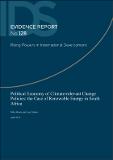| dc.contributor.author | Morris, M | |
| dc.contributor.author | Martin, L | |
| dc.coverage.spatial | South Africa | en |
| dc.date.accessioned | 2015-04-10T10:11:50Z | |
| dc.date.available | 2015-04-10T10:11:50Z | |
| dc.date.issued | 2015-04 | |
| dc.identifier.citation | Morris, M. and Martin, L. (2015) Political Economy of Climate-relevant Policies: the Case of Renewable Energy in South Africa, IDS Evidence Report 128, Brighton: IDS | en |
| dc.identifier.uri | https://opendocs.ids.ac.uk/opendocs/handle/20.500.12413/5986 | |
| dc.description.abstract | Integrated energy (electricity generation) policy is by no means a settled issue in the post-apartheid era in South Africa. The policy framework is predicated on the need for new and additional energy generation capacity. It assumes that coal will continue to remain the dominant source for electricity generation, but accepts that future energy generation will require an energy mix rather than primarily depending on a single form of electricity generation. In the past decade, however, the policy space has become increasingly fluid and contested by a variety of vested interests, as renewable energy (wind and solar power) has gained a serious foothold and has been championed by a variety of private and public sector actors. However, what is not clear, and is often muddled in the discourse, despite seeming clarity within official policy frameworks, is what the investment strategy should be, where this additional electricity energy generation should be sourced from, what the precise elements of the ‘mix’ should be, and which path to achieve it should be followed.
The central aim of this study is to investigate the power dimensions and struggles between these various interests and illustrate how they have manifested in terms of the different outcomes. The report therefore provides insight into how the political economy environment has impacted the unfolding of South Africa’s climate change policy, with a specific focus on the deployment of private sector-driven renewable energies – through the stillborn Renewable Energy Feed-in Tariff (REFIT) programme, followed by South Africa’s first successful Renewable Energy Independent Power Producer Procurement Programme (RE IPPPP). | en |
| dc.description.sponsorship | UK Department for International Development | en |
| dc.language.iso | en | en |
| dc.publisher | IDS/University of Cape Town | en |
| dc.relation.ispartofseries | IDS Evidence Report;128 | |
| dc.rights.uri | http://creativecommons.org/licenses/by/3.0/ | en |
| dc.subject | Climate Change | en |
| dc.subject | Politics and Power | en |
| dc.title | Political Economy of Climate-relevant Policies: the Case of Renewable Energy in South Africa | en |
| dc.type | IDS Evidence Report | en |
| dc.rights.holder | IDS | en |
| dc.identifier.ag | OT/11009/5/4/1/187 | |


